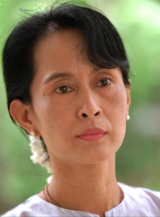
politician and the General Secretary of the National League for Democracy
. In the 1990 general election
, her National League for Democracy party won 59% of the national votes and 81% (392 of 485) of the seats in Parliament. She had, however, already been detained under house arrest
before the elections. She remained under house arrest in Burma for almost 15 of the 21 years from 20 July 1989 until her most recent release on 13 November 2010.
Suu Kyi received the Rafto Prize and the Sakharov Prize for Freedom of Thought
in 1990 and the Nobel Peace Prize
in 1991.
Revered monks and people! This public rally is aimed at informing the whole world of the will of the people... Our purpose is to show that the entire people entertain the keenest desire for a multiparty democratic system of government.![]()
It is not power that corrupts but fear. Fear of losing power corrupts those who wield it and fear of the scourge of power corrupts those who are subject to it.
![]()
It would be difficult to dispel ignorance unless there is freedom to pursue the truth unfettered by fear. With so close a relationship between fear and corruption it is little wonder that in any society where fear is rife corruption in all forms becomes deeply entrenched.
![]()
Among the basic freedoms to which men aspire that their lives might be full and uncramped, freedom from fear stands out as both a means and an end. A people who would build a nation in which strong, democratic institutions are firmly established as a guarantee against state-induced power must first learn to liberate their own minds from apathy and fear.
![]()
Fearlessness may be a gift but perhaps more precious is the courage acquired through endeavour, courage that comes from cultivating the habit of refusing to let fear dictate one's actions, courage that could be described as "grace under pressure" — grace which is renewed repeatedly in the face of harsh, unremitting pressure.
![]()

